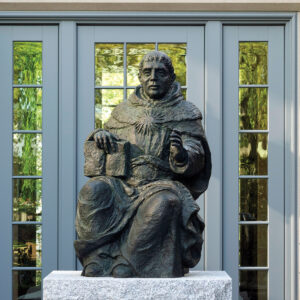St. Thomas Aquinas
Meet St. Thomas
By Holly Taylor Coolman, Associate Professor of Theology

It is hard to think of any name more closely associated with Catholic tradition than the 13th century Dominican scholar, St. Thomas Aquinas. Unfortunately, the association also sometimes involves dusty books and pointless philosophical distinctions. I came to know Aquinas, though, in a very different way.
I did not grow up Catholic, so I knew little about Aquinas until I began graduate study of theology. At that point, I had spent time studying Scripture, as well as fundamental questions of theology and philosophy. Then, I began to read Aquinas, and to see the brilliant, creative way tha the engaged these questions. “This guy,” I remember thinking, “is a genius.”
Encountering Aquinas in this way made it easier to see him in his own context. Like us, Aquinas lived at a time when new philosophical movements were raising important questions. Some insisted that these philosophical systems simply had to be avoided or refuted, but Aquinas instead plunged ahead, proposing new ways of being faithful to truth.
Even more, for him, truth was inextricably connected to love: love of God and love of neighbor. For me, he continues to be an important influence and a powerful model.
St. Thomas’ Prayer before Study
Creator of all things, true source of light and wisdom, lofty origin of all being, graciously let a ray of your brilliance penetrate into the darkness of my understanding and take from me the double darkness in which I have been born, an obscurity of both sin and ignorance.
Give me a sharp sense of understanding, a retentive memory, and the ability to grasp things correctly and fundamentally.
Grant me the talent of being exact in my explanations, and the ability to express myself with thoroughness and charm.
Point out the beginning, direct the progress, and help in completion; through Christ our Lord.
Amen.





